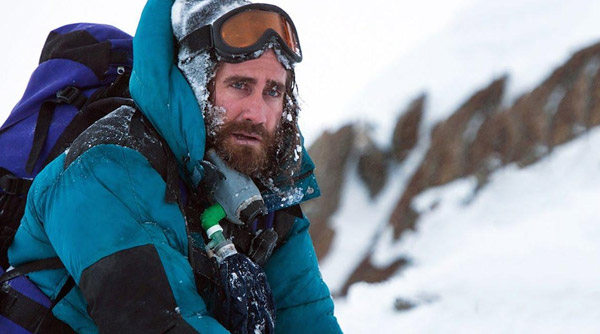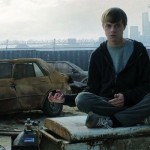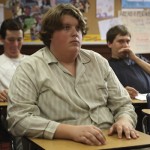Everest Review
The only character who matters in Everest is the titular mountain. This is something director Balthasar Kormakur gets across to his audience within minutes. As a group of bodies (that’s all they are in the moment) ascends the face of the mountain, the camera overcomes their understandably slow pace. As they’re pelted with howling winds and solid ice crystals, we’re taken up, up, up—a simple but incredibly effective and tone-setting shot that more or less opens a film that’s less man vs. nature than it is an inevitable march toward destruction. David slayed Goliath with a rock. This film’s Goliath is a rock, and its climbers are proverbial scissors. They lose.
Of course, some of the climbers caught in the unexpected Everest storm of May 1996, which this film chronicles, survive. Author Jon Krakauer (played here by Michael Kelly) is among them. He authored the terrific novel Into Thin Air on the heels of the Outside magazine article he agreed to with guide Rob Hall (Jason Clarke in the film) before this fateful climb. Notably, Everest is based on neither Into Thin Air nor The Climb, an alternative take on the events, written by guide Anatoli Boukreev. Perhaps that’s because the two books and their authors dispute the causes and effects of many small events and decisions made on the mountain. Or perhaps its because screenwriters William Nicholson and Simon Beaufoy wanted to cook up something even more dramatic, action-packed, and cinematic.
Whatever the case, I think it’s hard to argue that such an event would change people, and so it is with Everest. Even the survivors don’t really survive as the men and women they were before May 10, 1996. That might sound like a callous thing to say because their losses are nothing like the losses suffered by the deceased and their kin, but the sentiment is nonetheless accurate, and it gets precisely at what Kormakur is trying to say with his film. “Why do you climb?†Krakauer asks his fellow mountaineers just hours before their fateful ascent. “Because it’s there!†they respond in near unison. No less than 48 hours later, those who are still able to will sing a very different, consequence-driven tune.
Hall is the film’s lead, and Clarke plays him admirably. As the leader of Adventure Consultants, he’d summited Everest more than any other non-sherpa to date in 1996. Among his clients that year were Krakauer; Doug Hansen (John Hawkes), a mailman trying to prove something to himself and his kids; Yasuko Namba (Naoko Mori), a Japanese woman who’d climbed six of the Seven Summits before this Everest trip; and Beck Weathers (Josh Brolin), a wealthy Texan who’s climbing was causing trouble in his marriage.
Also with Hall on the mountain that year was Scott Fischer (Jake Gyllenhaal), the operator of a rival adventure company, Mountain Madness. Because there were so many other, less experienced crews on Everest with them that year, Hall and Fischer thought it prudent to team up, pool assets, and make sure everyone made it up and down as safely as possible. And for a while, it works, but the group finds itself both scattered and largely bottled up on the day of their summit, delaying them by several hours—a delay that proves fatal for some.
One of the film’s most impressive aspects is its editing. The perspective shifts rather seamlessly between the intimate and the majestic, which makes Everest an equal-opportunity terror. You’ll feel waylaid by the sounds ice and wind against the climbers’ tiny tents while also suffering a few very serious cases of vertigo as they traverse bottomless crevasses. All the while, we never lose sense of where everyone is both on the mountain and in relation to one another. It’s a tricky thing, but editor Mick Audsley pulled off beautifully. Credit also the film’s sound team, cinematographer, visual effects artists, and everyone else who brought this mountain to live in such an awe-inspiring way.
As far as the humans go, they aren’t particularly compelling. But you already knew that. Unless this film was to be three hours long, there was no way Hall, Fischer, Hansen, Weathers, and the rest would become fleshed-out, and even if the film went in that direction, we’d bemoan it for not spending enough time on the mountain. No, Everest is exactly what it needs to be when it comes to its characters. We care about them because they’re people facing insurmountable odds. We want Hall to make it home to his wife, Jan (Keira Knightley), and their unborn child. We want Hansen to hang the flag given to him by the kids who helped raise the funds for his trip. We want Yasuko to summit her seventh of Seven Summits. We want these people to succeed because they want to. Sometimes that’s all it takes.
I saw the film in IMAX 3D, and while the extra dimension didn’t really add much, nor did it take anything away. IMAX 2D might be the ideal format; The sound and sights are a marvel to behold on the biggest screen and with the best sound system possible. (Alas, that wasn’t an option.) However it’s available to you, I suggest you check it out in a theater. It’s one of those films—a Gravity, Life of Pi, or Interstellar. I’d probably enjoy it on a plane because I have a proclivity for mountain-climbing movies (Vertical Limit, anybody? Anybody??), but unless you’re weird like me, you’ll want to enjoy Everest in a theater. And enjoy it you will. It’s quite good.

















Pingback: Reviews: Everest (2015) | Online Film Critics Society
Pingback: Everest Movie Review